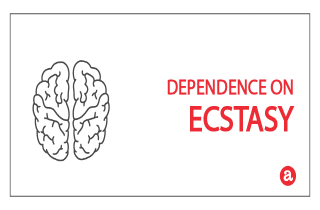MDMA acts as a stimulant and a psychedelic. It’s a party drug which produces an energizing effect, distortions in time and perception, and heightened pleasure of tactile experiences.
However, ecstasy dependence is less likely to develop in user than dependence upon other classes of drugs like opiates or benzodiazepines. Still, ecstasy does have the potential to alter brain’s chemistry, making individuals feel like they can only function normally when MDMA is present in their body. Read on to learn how ecstasy can cause dependence and addiction and when do you withdraw from ecstasy. Then, we invite your questions about ecstasy use, abuse, and symptoms of ecstasy addiction at the end.
Ecstasy dependence vs. addiction
Dependence occurs when the body, brain, and central nervous system become adjusted to the presence of a psychoactive drug. In effect, dependence occurs when you take continued doses of a drug and your system must adapt in order to achieve homeostasis. While dependence on ecstasy is not common, physical and psychological withdrawal symptoms from ecstasy do occur. Additionally, the “stacking” (taking three or more tablets at once) or “piggy-backing” (taking a series of tablets over a short period of time) of MDMA has many consequences on individuals’ physical and mental health. So can you become addicted to ecstasy even though dependence on ecstasy is rare?
Yes, addiction to ecstasy is possible. This is because addiction is mainly characterized by psychological symptoms of cravings and compulsive use. At its most basic, addiction to ecstasy is defined as continued use of MDMA despite physical or psychological harm. Under the influence of MDMA, users experience a full range of amazing emotions, mental stimulation and increased energy. Seeking these effects increases the risk of forming addiction, so users can’t stop using ecstasy even though they are aware of the side-effects and wish they could stop.
Ecstasy dependence time: How long to be dependent on ecstasy?
The use of almost any substance can become irrational and extreme in some individuals, and there are certainly those who have taken ecstasy on a daily basis for extended periods of time. However, most users binge on ecstasy for short periods of time. Long term use of ecstasy is defined as two doses of 10mg per kilo per day when taken for four days or more. For regular users, it’s not uncommon for MDMA to rapidly take on an exaggerated importance in people’s lives.
Dependence on ecstasy symptoms
Studies have shown that heavy ecstasy use leads to more symptoms of ecstasy dependence than light use. It’s surprising that withdrawal is a symptom least reported in individuals diagnosed with ecstasy dependence. On the other hand, the most prevalent symptoms of ecstasy dependence are the following:
- Continuous ecstasy use in spite of being aware of and experiencing side-effects
- Developing tolerance to ecstasy
- Needing a lot of time to recover from MDMA’s effects
- Spending a great deal of time on activities related to ecstasy use
Physical dependence on ecstasy
The experts’ opinions vary on the subject of physical dependence on MDMA. Most users take ecstasy only occasionally, which makes the dependence not very prominent. Although physical dependence on MDMA isn’t likely to happen in people who abuse it regularly, numerous physical and mental health problems arise after taking large doses over a short period of time by “stacking” or “piggy-backing”. For example, users can get physically dependent on the other elements contained in MDMA tablets (e.g. amphetamines), which can lead to physical cravings upon cessation.
Psychological dependence on ecstasy
In chronic users, psychological dependence on MDMA may develop. Particularly, people with a history of substance abuse can become powerfully psychologically dependent on ecstasy. Mental dependence on ecstasy is characterized by deterioration in social and professional functioning, cravings, and increased tolerance. By using larger amounts of ecstasy, the severity of adverse effects rises. Yet, it can be very difficult to stop or reduce use, since a person psychologically dependent on ecstasy dependent will continue to seek the feelings of pleasure from MDMA despite negative life consequences.
Ecstasy dependence withdrawal
Ecstasy targets the brain’s neurotransmitters and floods them with serotonin. But after its effects wear off, there is a deficit of serotonin in the brain and users go through a crash. The crash may trigger feelings of anxiety, depression, paranoia, and irritability. People also experience drug cravings and sleep disturbances. Depleted serotonin levels make a person feel a lack of motivation and drive, and may find it difficult to concentrate.
Ecstasy dependence questions
Do you still have questions about dependence on ecstasy or the effects of dependence and withdrawal? Please leave your questions, comments or feedback in the section below. We are happy to reply your questions personally and promptly. We can also refer you to other professionals when needed.









Related Posts